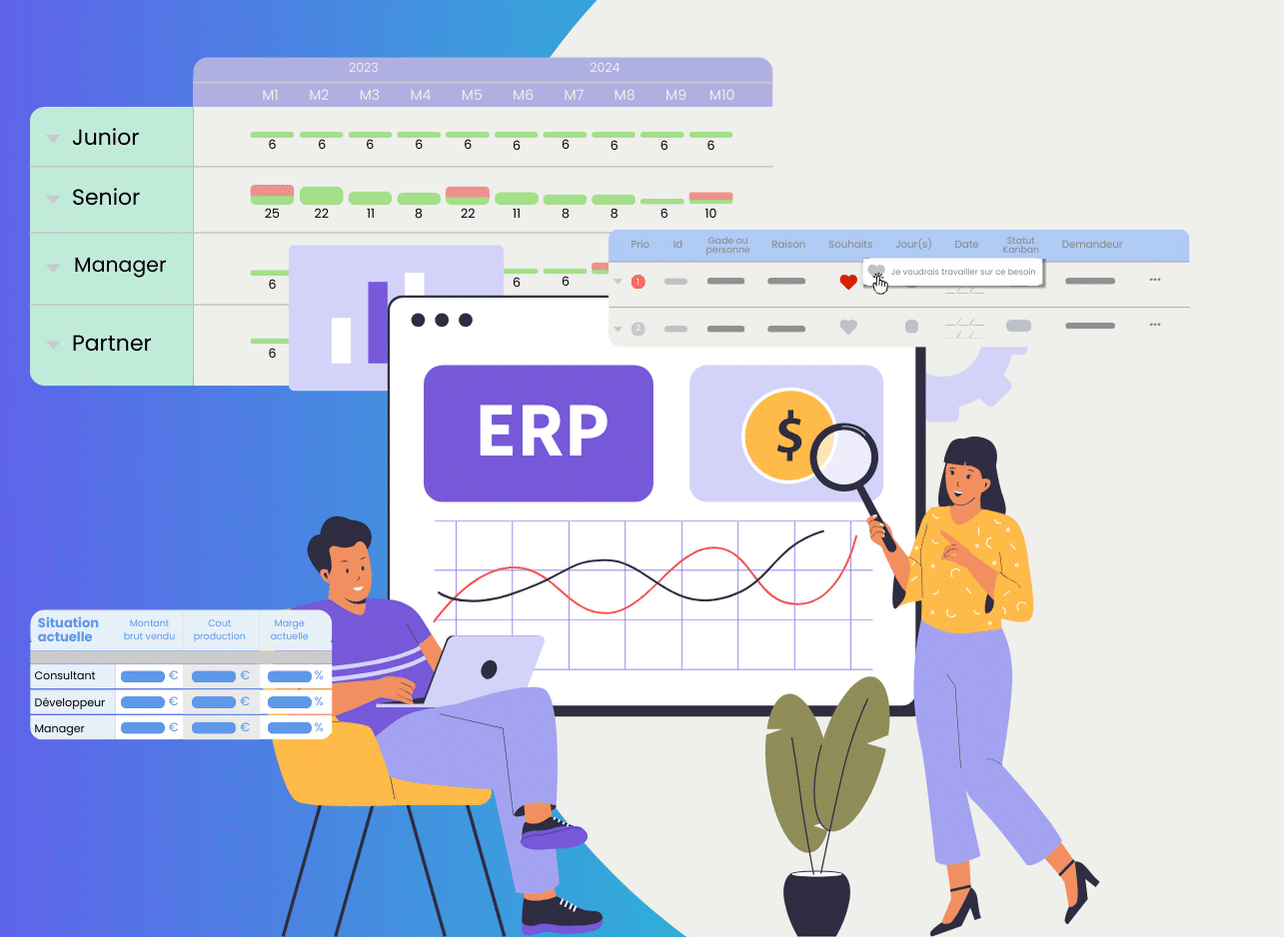Les meilleurs ERP métiers pour la vente de projet

Choisir un ERP représente un enjeu stratégique. En effet, cette décision a un impact économique conséquent car l’ERP est non seulement coûteux à implémenter, mais surtout, permet d’optimiser la rentabilité de l’entreprise. Pour les métiers spécialisés comme ceux de la logistique, du bâtiment, de la comptabilité ou les métiers du service qui nécessitent une certaine agilité, il faudra arbitrer entre un ERP généraliste ou un ERP orienté métier.
Dans cet article, nous vous proposons dans une première partie une liste d’ERP métier projet et d’ERP pour les sociétés de service. Ensuite, nous avons conçu un guide pour vous aider à bien comprendre les différences entre ERP métier et ERP généraliste. Enfin, une liste des briques fonctionnelles à considérer pour choisir votre ERP dédié aux sociétés de services vous aidera à sélectionner l’outil adapté à vos besoins et votre taille d’entreprise.
Les meilleurs ERP métiers pour vendre vos projets
Stafiz, l’ERP tout-en-un pour un pilotage de bout-en–bout
Stafiz est un ERP métier pour la vente de projet. Ainsi, il combine des fonctionnalités de gestion de projet et de planification pour permettre un pilotage complet.
Cas d’usages
Stafiz permet :
- la gestion de projet,
- le staffing, la gestion des temps et activités,
- la prévision financière,
- la gestion des risques projet,
- la facturation projet.
Gestion de l’avant-vente
Stafiz peut être intégré avec un CRM, ce qui permet notamment d’estimer un budget pour les opportunités proches de convertir. L’outil offre la possibilité de pré-planifier les ressources sur les opportunités ayant une forte chance de devenir projets.
Pilotage de la rentabilité
Stafiz aide à maximiser la rentabilité car cet ERP intègre un processus complet de planification. Ainsi, il offre la possibilité de :
- gérer les plans de charges collaborateurs et projets,
- planifier le besoin en ressources,
- mettre en lien la planification de projet et les prévisionnels financiers,
- simuler des scénarios de planification pour optimiser la rentabilité,
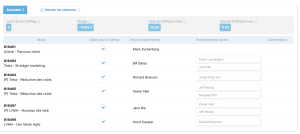
Le scenario builder intelligent de Stafiz
- mettre en place des alertes pour être notifié des déviations à venir,
- définir un budget prévisionnel projet,
- suivre les dépenses en temps réel.
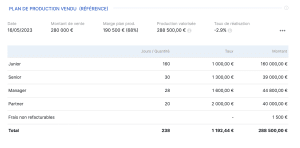
Création du budget initial de référence depuis Stafiz avec suivi de sa consommation
Planification projet
En tant qu’ERP pour les sociétés de service, Stafiz facilite la planification projet grâce à des fonctionnalités de suivi prévisionnel de la production et du reste à faire, une fonctionnalité actuellement peu répandue sur le marché.
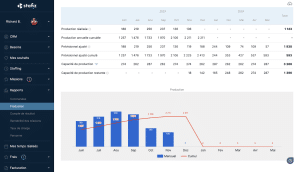
Rapport de production dans Stafiz
De plus, Stafiz prend en charge le capacity planning. Il offre une vue long terme sur les disponibilités, permettant alors l’allocation par recherche de profils ou par compétences.
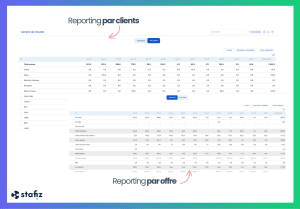
Le meilleur outil de suivi budgétaire de projet
Automatisations
Parmi les fonctionnalités d’automatisations, de nombreuses ont été intégrées à la partie facturation :
- Possibilité de reprise des informations depuis les bons de commande, pour la génération et l’envoi en masse,
- Déclenchement de facturation par livrable,
- Mise en place de relances automatiques impayées,
- Reconnaissance automatique (appelée technologie OCR), pour la prise en charge des notes de frais,
- Prise en compte des différentes méthodes de facturation (régie / forfait).
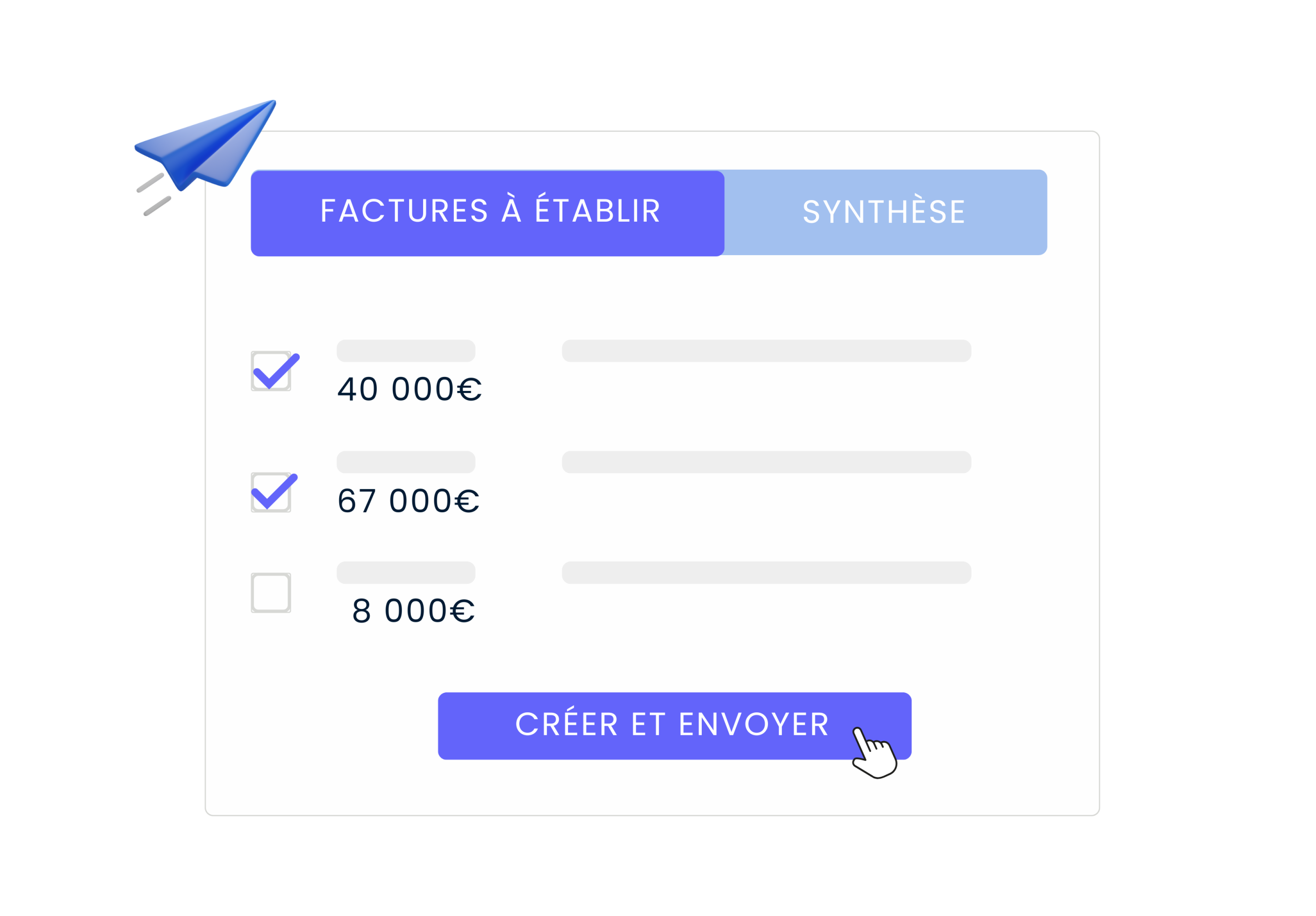
Le gain de temps généré par l’automatisation de la facturation se compte en jour
Réduisez considérablement vos tâches administratives tout en accélérant votre cycle de trésorerie.
D’autres fonctionnalités d’automatisation sont portées sur le suivi des temps : ainsi, les données financières peuvent être mises à jour automatiquement en fonction du temps saisi. En effet, lorsque le temps saisi est connecté, il peut s’ajuster automatiquement pour les cas de régie.
Quelles entreprises utilisent Stafiz ?
Stafiz se présente comme un ERP métier spécialisé en gestion de projet, adapté aux ESN, aux métiers du consulting, aux agences, pour des TPE, PME, ETI, et grandes entreprises jusqu’à environ 1000 employés.
IFS, l’ERP dédié à l’industrie
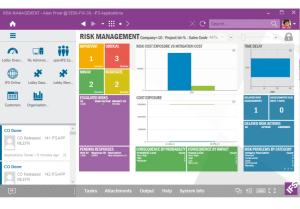
IFS est un ERP métier projet dédié à la gestion de projet pour l’industrie.
Cas d’usages
Robuste et construit avec le principe de modules, il adopte une approche métier et permet notamment la gestion de projet en multi-pays.
De plus, il prend également en charge :
- le suivi des coûts,
- la gestion des ressources humaines,
- la gestion de la chaîne d’approvisionnement,
- la gestion de la production,
- la gestion documentaire,
- l’analytique avancée.
IFS permet la gestion de projet dans les industries complexes telles que l’ingénierie, la construction, les secteurs industriels.
Quelles entreprises utilisent IFS ?
IFS s’adresse aux moyennes et grandes entreprises avec des problématiques industrielles complexes, d’internationalisation et de multi-sites.
Ypareo, un ERP pour les organismes de formation
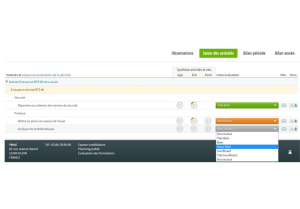
Ypareo est un ERP métier spécialisé dans la gestion des organismes de formation professionnelle de type CFA (Centres de Formation d’Apprentis) et OFA (Organismes de Formation d’Apprentissage). Ainsi, il adresse les besoins spécifiques liés à la formation professionnelle, de la prospection à la facturation.
Cas d’usages
Ypareo prend en charge :
- la gestion commerciale et CRM,
- la gestion administrative et financière,
- la gestion pédagogique de type planification des formations, suivi des absences, évaluations,
- la mise en place de portails collaboratifs,
- l’interconnexion avec des outils tiers institutionnels (CPF, France Travail, Parcoursup etc.) grâce à une API.
Ypareo facilite la gestion administrative et pédagogique des organismes de formation.
Quelles entreprises utilisent Ypareo ?
Ypareo s’adresse aux organismes de formation privés, CFA, réseaux d’écoles, pour les petites et moyennes structures ainsi que les grands réseaux multi-sites.
SAP, l’ERP hautement personnalisable
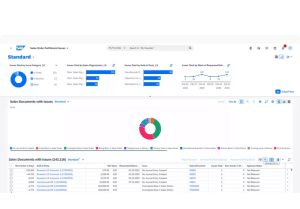
Cas d’usages
Bien qu’il y a quelques années, SAP renvoyait l’image d’un ERP dédié aux métiers de la logistique, SAP propose aujourd’hui différents ERP pour différentes tailles d’entreprises :
- S/4HANA (grandes entreprises),
- ByDesign (ETI),
- Business One (PME).
Ainsi, les ERP proposés par SAP permettent de coordonner les départements de finance, d’achats, de RH et d’autres. Ils offrent un grand nombre de fonctionnalités, avec un accent sur la BI et l’analytique. Toutefois, SAP reste une ERP généraliste mais dit modulable car très personnalisable.
Les ERP de SAP sont des ERP généralistes mais modulables, de manière à répondre aux besoins des entreprises en recherche d’un ERP métier. Ils sont particulièrement riches en fonctionnalités.
Quelles entreprises utilisent Ypareo ?
Avec une réputation assez orientée grand groupe,
SAP propose donc un modèle d’ERP dédié aux sociétés de service, idéal pour les grands groupes, entreprises internationales et industries très réglementées. Ses fonctionnalités facilitent le déploiement multi-pays. Toutefois, SAP s’adresse en réalité à toutes les tailles d’entreprises à travers des produits dédiés.
Deltek, l’ERP pour un grand degré de précision
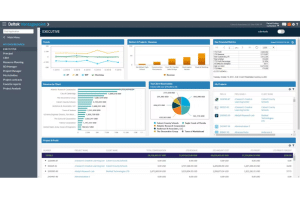
Deltek est un ERP métier projet pour la gestion de projets de bout en bout. Ainsi, il propose des outils de reporting et de BI robustes afin d’assurer le pilotage des ressources humaines et matérielles. L’intégration du planning avec le CRM et les finances facilite l’allocation multi-projet et le matching des compétences avec les besoins projet. Il offre entre autres les fonctionnalités suivantes :
Cas d’usages
Suivi budgétaire
- Planification avec vues Gantt.
- Vue par jalons et chemin critique.
Gestion des contrats et livrables
- Suivi des intercontrats.
- Facturation partielle, automatique, et en masse.
- Suivi des retenues, avances, échéanciers.
Deltek permet la gestion de projet pour les entreprises dont le besoin de précision est élevé, aussi bien d’un point de vue financier qu’au niveau du suivi des temps passés.
Quelles entreprises utilisent Deltek ?
Deltek s’adresse principalement aux bureaux d’études et d’ingénierie ainsi qu’aux entités gouvernementales et aux très grandes structures.
Odoo, l’ERP open-source modulable

Odoo est un ERP généraliste adapté aux sociétés de service. Open-source, belge, connu pour ses modules et son degré élevé de personnalisation, ill est aussi réputé pour sa communauté étendue. Il propose notamment :
Cas d’usages
Gestion de projet
- Visualisation sous forme de Gantt, calendrier ou Kanban.
- Mise en place de jalons et de dépendances.
- Suivi d’avancement.
- Gestion de la charge.
Temps et dépenses
- Gestion des frais.
- Validation des frais multi-niveaux.
- Mise en place de feuilles de temps.
Facturation
- Gestion des différents modes de facturation : forfaitaire, abonnement.
- Gestion multi-taux et avoirs.
- Liaison avec les projets, feuilles de temps et CRM.
Odoo est un ERP généraliste adapté à de nombreux métiers et notamment aux professionnels du service tels que les agences, cabinets d’architecture, d’experts-comptables ou encore ESN.
Quelles entreprises utilisent Odoo ?
Odoo s’adresse aux TPE et PME à la recherche d’une solution personnalisable. Toutefois, sa difficulté d’implémentation nécessite souvent l’accompagnement d’un consultant ou intégrateur.
MyUnisoft, l’ERP pour les experts-comptables
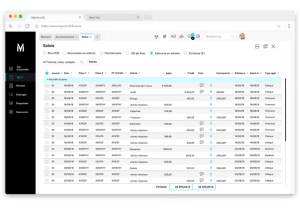
Cas d’usages
MyUnisoft est un ERP français dédié aux cabinets d’experts-comptables et leurs clients PME et TPE. Ainsi, il facilite l’automatisation comptable et fiscale avec :
- L’intégration OCR et reconnaissance automatique des factures.
- L’import automatique des écritures bancaires.
- La génération des écritures comptables standards.
Il permet :
- La gestion interne du cabinet.
- La gestion des clients et commerciale.
- Pilotage financier.
- La mise à disposition d’un portail client collaboratif.
- Des intégrations grâce aux API.
MyUnisoft facilite la gestion des cabinets comptables et de leurs relations client grâce à une synchronisation des différentes sources de données (caisses, partenaires).
Cet ERP métier automatise les tâches de saisie et de déclaration, tout en offrant une plateforme client partagée.
Quelles entreprises utilisent MyUnisoft ?
MyUnisoft s’adresse aux cabinets comptables et experts comptables, de taille moyenne à petite.
Cegid Loop, l’ERP pour automatiser la production comptable
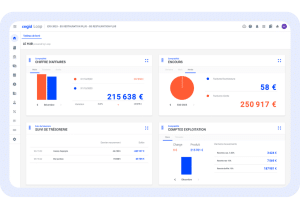
Cegid Loop est un ERP métier également destiné aux experts-comptables pour automatiser, collaborer et améliorer la relation client.
Sa valeur ajoutée étant portée sur l’automatisation, assistée par l’IA, Cegid Loop fait gagner du temps en automatisant les tâches à faible valeur ajoutée.
Cegid dispose d’une certaine notoriété et crédibilité dans le milieu de la comptabilité.
Cas d’usages
Le logiciel propose différentes fonctionnalités.
Production comptable automatisée
- OCR automatique pour extraire les données des documents reçus.
- Import automatique bancaire et lettrage intelligent pour associer automatiquement les écritures comptables aux transactions bancaires correspondantes.
- Automatisation des liasses fiscales, TVA, clôture annuelle dans le respect des réglementations en vigueur.
Suivi temps passé
- Suivi du temps passé par client, mission ou collaborateur.
- Suivi de la rentabilité par client.
- Planification des tâches récurrentes.
Cegid Loop permet la gestion de cabinet comptable ainsi que la production comptable.
Ses fonctionnalités offrent une transparence financière grâce à des tableaux de bord en temps réel.
Quelles entreprises utilisent Loop ?
Cegid Loop s’adresse aux cabinets et réseaux d’experts comptables, notamment de petites et moyennes structures.
IOvision, l’ERP de gestion de projet avec une vision 360°
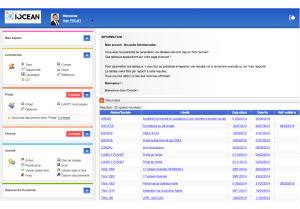
IOvision est un ERP métier projet français conçu pour les entreprises de services. Il permet une vision à 360° de l’activité et offre les fonctionnalités suivantes.
Cas d’usages
Pilotage et finances
- Facturation : émission de factures, suivi des paiements, gestion du reste à facturer, relances automatisées.
- Suivi budgétaire : contrôle des coûts et analyse de rentabilité.
- Reporting financier : tableaux de bord avec visualisation en temps réel de l’avancement des projets, des marges et des alertes.
Gestion des ressources et des projets
- Suivi des temps (saisie des temps passés par projet, collaborateur et client).
- Mise en place de plan de charge et calendrier multi-projets.
- Gestion des contrats et avenants.
Fonctionnalités transverses
- Gestion multi-entité : multi-société et multi-pays.
- CRM intégré : suivi commercial, relation client.
- SIRH intégré : publication d’annonces, suivi des absences et congés.
IOvision propose un ERP scalable dédié aux sociétés de services, scalable car composé de modules, auquel il est possible d’ajouter des fonctionnalités.
Quelles entreprises utilisent IOvision ?
IOvision s’adresse aux bureaux d’études, PME et ETI dans le conseil ainsi qu’aux structures multi-entités qui ont besoin d’une flexibilité au niveau local.
Biloba, l’ERP pour la gestion de projet dans le suivi de chantier
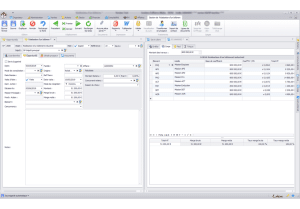
Biloba est un ERP métier projet français conçu pour les entreprises de services, surtout pour les secteurs du bâtiment, du suivi de chantier, du BTP et de l’ingénierie.
Cas d’usages
Biloba permet de faciliter la gestion de projet dans les entreprises d’ingénierie.
Il prend en charge la gestion documentaire et d’appels d’offres CAO/DAO ainsi que les études techniques. Modulable, il est scalable et peut accompagner la croissance des entreprises.
Il permet :
- Le pilotage des affaires : couverture des lots / tranches / appels d’offres,
- La facturation : à l’avancement et du reste à facturer,
- La mise à disposition de modules supports : gestion fournisseurs, sous‑traitance, gestion des plannings, budget prévisionnel en durée et valeur, analyse des coûts engagés.
Quelles entreprises utilisent Biloba ?
Biloba s’adresse aux structures qui veulent associer compétences techniques et administratif, notamment le temps passé, la gestion des ressources et de la sous-traitance. Il concerne les bureaux d’études de taille moyenne avec des projets techniques complexes, qui ont besoin d’un découpage par lots ou tranches.
Qu’est-ce qu’un ERP pour sociétés de services ?
Stocker et centraliser les données
Un ERP (Enterprise Resource Planning en anglais) ou Progiciel de Gestion Intégré en français, est un logiciel qui permet de visualiser et de coordonner les opérations de gestion d’une entreprise.
Dans le contexte d’un ERP pour société de services, cet outil stocke et centralise les données de l’entreprise telles que les ressources, les finances, les projets, les opportunités ou encore les clients. Souvent, l’ERP est d’ailleurs connecté au CRM, qui facilite la gestion de la relation client.
Faciliter l’optimisation et la prise de décisions
L’utilisation d’un ERP offre une visibilité qui a pour but d’aider à optimiser les différents paramètres tels que les ressources, les finances ou les plannings.
Ce type d’outils propose généralement des fonctionnalités d’automatisation. Celles-ci aident non seulement à gagner du temps, mais contribuent à une amélioration de la fiabilité en limitant l’intervention humaine.
Un ERP pour les sociétés de service est donc un outil puissant qui regroupe toutes les données pertinentes nécessaires à la prise de décisions, généralement accessibles en temps réel. Ainsi, l’ERP suit et accompagne la croissance de l’entreprise.
ERP généraliste et ERP métier : quelles différences ?
Le choix d’un ERP métier vs ERP généraliste constitue un débat répandu. Mais alors, quels sont les avantages et les inconvénients de chacun ?
Un ERP généraliste pour un maximum de flexibilité
Sans surprise, L’ERP généraliste s’avère standard. Conçu pour s’adapter à la majorité des métiers, on dit de l’ERP généraliste qu’il est flexible, mais peu spécialisé. En effet, il s’adresse à des industries peu complexes et peu spécifiques. On parle donc d’ERP horizontal, au contraire de l’ERP métier, dit vertical.
Désormais, de nombreux ERP généralistes sont conçus par modules, de manière à être personnalisables. Ils peuvent ainsi gagner en spécificité grâce à ces modules pour convenir à des secteurs aux contraintes particulières comme la restauration, l’hôtellerie, les transports, l’industrie etc.
L’avantage d’un ERP généraliste est qu’il s’adresse à de nombreuses entreprises : le produit est donc régulièrement maintenu à jour, en constante évolution, intégrant correctifs et innovations.
Un ERP métier pour plus de précisions
Un ERP métier est spécifique : il s’adresse à un métier. Ainsi, il s’agit d’un logiciel dédié à un métier, à ses contraintes, son mode de fonctionnement.
L’ERP métier s’adresse à une cible particulière, qu’il maîtrise. De ce fait, il est conçu de manière à répondre à ses besoins le plus précisément possible, tant d’un point de vue opérationnel que réglementaire. Le produit est amené à évoluer grâce aux retours clients.
Pour les métiers du service, l’ERP métier projet se concentre généralement sur des fonctionnalités clés comme la facturation et le suivi des temps passés, en plus de la gestion de projet classique. De plus, ils permettent généralement d’optimiser la gestion des budgets ou des devis en fonction du mode de facturation, de manière à optimiser la rentabilité. Ainsi, ce type d’ERP permet généralement de calculer la rentabilité par projet, par consultant ou par client.
Un ERP métier est-il indispensable ?
Dans les métiers de services, un ERP métier projet est souvent recommandé. Indispensable ou obligatoire : non. Toutefois, l’utilisation d’un ERP spécialisé facilite la gestion, car les besoins opérationnels et financiers sont en effet bien précis.
Or, un ERP métier dédié aux services permet bien souvent de configurer les droits d’accès de manière à ce que les différents rôles (chefs de projet, consultants, responsables d’affaires) puissent accéder aux informations nécessaires à leur mission telles que le temps passé, le budget, les marges.
Avec un ERP généraliste, c’est souvent le département financier qui est chargé de transmettre les informations. Cela nécessite des délais et allers-retours. Or, un accès à l’information personnalisé limite ces contraintes. Ainsi, un chef de projet qui souhaite consulter le budget en temps réel sur un projet peut rapidement se procurer l’information par ses propres moyens pour prendre les décisions adéquates.
Les différents critères pour choisir un ERP pour société de services
Comme évoqué en introduction : choisir un ERP est une démarche stratégique qui ne s’improvise pas. Pour vous aider, voici une liste de critères et de fonctionnalités à considérer par usage, par activité et par taille d’entreprise.
Par usage
Voici une liste des briques fonctionnelles souvent intégrées aux ERP pour sociétés de services.
Gestion de projet
- Planification : organisation des tâches, des jalons, des dépendances, chemin critique.
- Possibilité de visibilité sous différentes vues : Kanban, Gantt.
- Suivi des livrables de projet, gestion des modifications (changement de périmètre).
Gestion des ressources
- Gestion des compétences.
- Vision sur les disponibilités.
- Suivi et optimisation du taux de charge.
- Planification prévisionnelle, pré-staffing, taux d’allocation vs charge.
- Gestion du staffing, des sous-traitants voire du matériel.
Suivi des temps et des dépenses
- Saisie des heures (feuilles de temps) et suivi des temps.
- Workflows d’approbation.
- Suivi des coûts directs et indirects.
Facturation
- Modes de facturation : forfait, abonnement, jalons, mixte.
- Facturation partielle, périodiques.
- Reconnaissance des revenus en fonction des normes, du projet.
Comptabilité et gestion financière
- Suivi des coûts et marges projet par projet.
- Reporting financier.
- Gestion budgétaire, prévision, cashflow.
- Comptabilité générale et analytique.
- Gestion du multi-devises.
- Gestion des multi-entités.
- Pré-comptabilité.
Reporting
- Configuration et visualisation d’indicateurs clés : marge, rentabilité, burn rate, utilisation des ressources, avancement vs plan, risques, rentabilité par client/projet.
- Mise en place de tableaux de bord en temps réel et d’alertes.
- Création de forecasts et scénarios.
Gestion des contrats clients / fournisseurs
- Définition des conditions contractuelles et modalités de paiement.
- Suivi des engagements.
- Gestion des relations fournisseurs en cas d’externalisation ou de sous‑traitance.
Intégrations
- CRM (prospection / devis)
- Outils de gestion des documents,
- Intégration avec RH pour la gestion de la paie, des congés,
- Accessibilité web/mobile.
Manageabilité
- Configuration et personnalisations possible sans coder,
- Localisation fiscale et réglementaire en fonction du pays ou du secteur,
- Sécurité, conformité, droits d’accès
Par activité
Voici une liste des fonctionnalités à considérer en fonction du type de structure.
Cabinets de conseils
- Pilotage de projet au forfait.
- Planification de projet en permettant de faire le lien entre budget et staffing.
💡ERP recommandés : Stafiz, Deltek.
Conseil en IT, intégrateurs
- Facturation qui prend en charge différentes approches : régie, forfait, mixte régie et forfait, Tierce Maintenance Applicative (TMA).
💡ERP recommandés : Stafiz, Deltek
ESN
- Gestion de positionnement de profil sur des besoins clients,
- CRM,
- Gestion des temps.
💡ERP recommandés : Stafiz
Cabinets d’architecture
- Suivi de projet et facturation : suivi et facturation par lot / phase (possibilité de segmenter les projets par grandes phases avec budget alloué et facturation à l’avancement).
💡ERP recommandés : Deltek
Agences
- Suivi des tâches précis : granularité fine dans la planification (journée, heure) avec un fort besoin de flexibilité car sujet aux changements
- GTA.
💡ERP recommandés : Stafiz, Odoo
Organismes de formation ou de coaching
- Planification en heure : possibilité de placer les heures au forfait,
- Suivi des factures : gestion de la sous-traitance.
💡ERP recommandés : Ypareo
Expert comptable :
- Suivi des heures : planification, suivi des temps,
- Gestion des tâches récurrentes : prise en charge des opérations répétitives chaque mois et des projets qui reviennent chaque année,
- Confirmation du travail réalisé : possibilité de marquer une tâche comme effectuée, avec temps passé confirmé ou pré-rempli,
- Gestion multi-clients : suivi efficace de petites tâches réparties sur un grand nombre de clients.
💡ERP recommandés : Stafiz, Cegid Loop, MyUnisoft
Bureau d’études ou d’ingénierie
- Gestion des tâches : gestion des dépendances, chemin critique,
- Gestion de phases d’un projet : jalons, livrables,
- Gestion des ressources : planification par ressource qualifiée, suivi des taux de charge et d’occupation,
- Gestion des contrats et avenants,
- Gestion de la collaboration : inter équipe, document, versioning, échanges clients.
💡ERP recommandés : Biloba, IOvision
Par taille d’entreprise
Le choix d’un ERP se fait également en fonction de la taille de l’entreprise et du niveau de complexité recherché.
Voici le type de fonctionnalités à considérer en fonction de la taille d’entreprise.
Inférieur ou égal à 50 collaborateurs
- Gestion des achats,
- Workflow pour la gestion des demandes de frais,
- Intégration SIRH.
Entre 50 et 100 collaborateurs
- Facturation interco / intraco (entre équipes),
- Intégration comptable solde (comprenant outil comptable, exports),
- Reporting financiers auditables.
Ainsi, l’ERP se présente comme un levier de performance et de rentabilité pour toute entreprise ayant de forts besoins en gestion de projet. Les sociétés de services tels que les agences, ESN, ou cabinets ont donc tout intérêt à s’équiper d’un ERP puissant, adapté à leurs besoins et à leur taille d’entreprise.
Choisir entre un ERP métier ou un ERP généraliste composé de modules peut se révéler une décision lourde. En effet, un tel outil accompagne généralement la croissance de l’entreprise sur plusieurs années. Alors, temps d’implémentation, courbe d’apprentissage, intégration, support client et fonctionnalités disponibles vont donc constituer des critères importants à considérer pour faire un choix.
Questions fréquentes :
ERP est l’acronyme de Enterprise Resource Planning. Ce terme désigne une catégorie de logiciels visant à gérer et intégrer les processus clés d’une entreprise, tels que la finance, les ressources humaines, la production et la logistique. Son objectif principal est de centraliser les données dans une base unique pour optimiser la prise de décision.
Le but fondamental d’un ERP est d’assurer l’intégration et l’automatisation des opérations transversales pour améliorer l’efficacité globale de l’organisation. Il vise à fournir une vision unifiée et en temps réel de l’entreprise en brisant les silos de données entre les services. Cela permet de rationaliser les flux de travail, de réduire les coûts opérationnels et de garantir la conformité réglementaire.
La traduction la plus courante et officielle d’ERP en français est Progiciel de Gestion Intégré (PGI). Ce terme reflète bien le rôle du logiciel : intégrer toutes les fonctions de gestion de l’entreprise dans une seule application.

